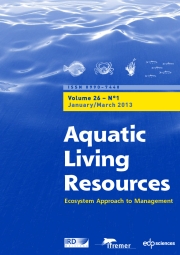Crossref Citations
This article has been cited by the following publications. This list is generated based on data provided by
Crossref.
Morales-Nin, Beatriz
and
Aldebert, Yvonne
1997.
Growth of juvenile Merluccius merluccius in the Gulf of Lions (NW Mediterranean) based on otolith microstructure and length-frequency analysis.
Fisheries Research,
Vol. 30,
Issue. 1-2,
p.
77.
Recasens, L.
Lombarte, A.
Morales‐Nin, B.
and
Tores, G. J.
1998.
Spatiotemporal variation in the population structure of the European hake in the NW Mediterranean.
Journal of Fish Biology,
Vol. 53,
Issue. 2,
p.
387.
Morales‐Nin, B.
Tores, G. J.
Lombarte, A.
and
Recasens, L.
1998.
Otolith growth and age estimation in the European hake.
Journal of Fish Biology,
Vol. 53,
Issue. 6,
p.
1155.
Goñi, R.
Alvarez, F.
and
Adlerstein, S.
1999.
Application of generalized linear modeling to catch rate analysis of Western Mediterranean fisheries: the Castellón trawl fleet as a case study.
Fisheries Research,
Vol. 42,
Issue. 3,
p.
291.
Erzini, K
Gonçalves, J.M.S
Bentes, L
Lino, P.G
and
Ribeiro, J
2001.
The hake deepwater semi-pelagic (“pedra-bola”) longline fishery in the Algarve (southern Portugal).
Fisheries Research,
Vol. 51,
Issue. 2-3,
p.
327.
Caddy, J.F
and
Seijo, J.C
2002.
Reproductive contributions foregone with harvesting: a conceptual framework.
Fisheries Research,
Vol. 59,
Issue. 1-2,
p.
17.
Lleonart, Jordi
2004.
Management of Shared Fish Stocks.
p.
113.
Coll, Marta
Palomera, Isabel
Tudela, Sergi
and
Sardà, Francesc
2006.
Trophic flows, ecosystem structure and fishing impacts in the South Catalan Sea, Northwestern Mediterranean.
Journal of Marine Systems,
Vol. 59,
Issue. 1-2,
p.
63.
Maravelias, C. D.
and
Papaconstantinou, C.
2006.
Geographic, seasonal and bathymetric distribution of demersal fish species in the eastern Mediterranean.
Journal of Applied Ichthyology,
Vol. 22,
Issue. 1,
p.
35.
de Pontual, Hélène
Groison, Anne Laure
Piñeiro, Carmen
and
Bertignac, Michel
2006.
Evidence of underestimation of European hake growth in the Bay of Biscay, and its relationship with bias in the agreed method of age estimation.
ICES Journal of Marine Science,
Vol. 63,
Issue. 9,
p.
1674.
Bahamon, Nixon
Sardà, Francesc
and
Suuronen, Petri
2007.
Selectivity of flexible size-sorting grid in Mediterranean multispecies trawl fishery.
Fisheries Science,
Vol. 73,
Issue. 6,
p.
1231.
Bahamon, Nixon
Sardà, Francesc
and
Suuronen, Petri
2007.
Potential benefits from improved selectivity in the northwest Mediterranean multispecies trawl fishery.
ICES Journal of Marine Science,
Vol. 64,
Issue. 4,
p.
757.
Coll, Marta
Palomera, Isabel
Tudela, Sergi
and
Dowd, Michael
2008.
Food-web dynamics in the South Catalan Sea ecosystem (NW Mediterranean) for 1978–2003.
Ecological Modelling,
Vol. 217,
Issue. 1-2,
p.
95.
Bodiguel, Xavier
Loizeau, Véronique
Le Guellec, Anne-Marie
Roupsard, François
Philippon, Xavier
and
Mellon-Duval, Capucine
2009.
Influence of sex, maturity and reproduction on PCB and p,p′DDE concentrations and repartitions in the European hake (Merluccius merluccius, L.) from the Gulf of Lions (N.W. Mediterranean).
Science of The Total Environment,
Vol. 408,
Issue. 2,
p.
304.
Shannon, L.J.
Coll, M.
and
Neira, S.
2009.
Exploring the dynamics of ecological indicators using food web models fitted to time series of abundance and catch data.
Ecological Indicators,
Vol. 9,
Issue. 6,
p.
1078.
Bodiguel, Xavier
Maury, Olivier
Mellon-Duval, Capucine
Roupsard, François
Le Guellec, Anne-Marie
and
Loizeau, Véronique
2009.
A dynamic and mechanistic model of PCB bioaccumulation in the European hake (Merluccius merluccius).
Journal of Sea Research,
Vol. 62,
Issue. 2-3,
p.
124.
Coll, Marta
Palomera, Isabel
and
Tudela, Sergi
2009.
Decadal changes in a NW Mediterranean Sea food web in relation to fishing exploitation.
Ecological Modelling,
Vol. 220,
Issue. 17,
p.
2088.
Rätz, Hans-Joachim
Cheilari, Anna
and
Lleonart, Jordi
2010.
On the performance of fish stock parameters derived from VIT pseudo-cohort analysis.
Scientia Marina,
Vol. 74,
Issue. 1,
p.
155.
Mendoza, Manuel
García, Teresa
and
Baro, Jorge
2010.
Using classification trees to study the effects of fisheries management plans on the yield of Merluccius merluccius (Linnaeus, 1758) in the Alboran Sea (Western Mediterranean).
Fisheries Research,
Vol. 102,
Issue. 1-2,
p.
191.
de Juan, S.
and
Lleonart, J.
2010.
A conceptual framework for the protection of vulnerable habitats impacted by fishing activities in the Mediterranean high seas.
Ocean & Coastal Management,
Vol. 53,
Issue. 11,
p.
717.


